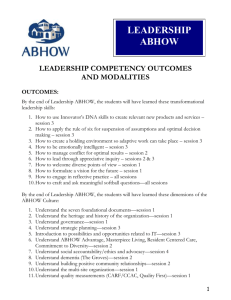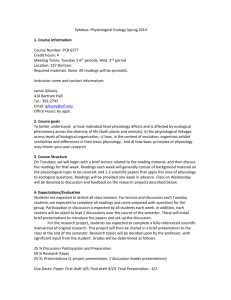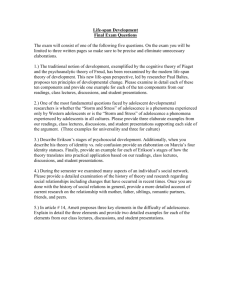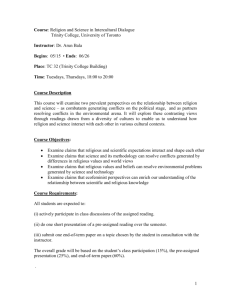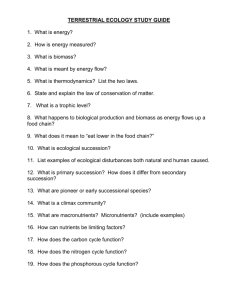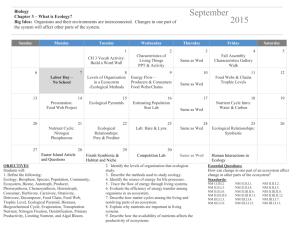ADVANCED MARINE ECOLOGY
advertisement
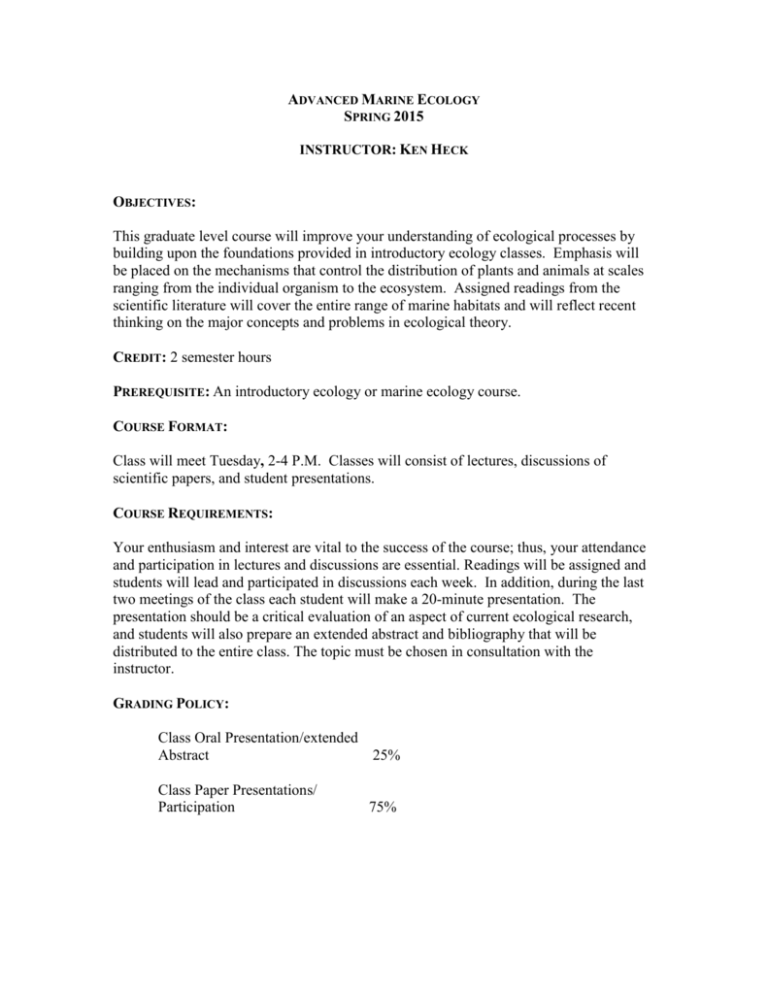
ADVANCED MARINE ECOLOGY SPRING 2015 INSTRUCTOR: KEN HECK OBJECTIVES: This graduate level course will improve your understanding of ecological processes by building upon the foundations provided in introductory ecology classes. Emphasis will be placed on the mechanisms that control the distribution of plants and animals at scales ranging from the individual organism to the ecosystem. Assigned readings from the scientific literature will cover the entire range of marine habitats and will reflect recent thinking on the major concepts and problems in ecological theory. CREDIT: 2 semester hours PREREQUISITE: An introductory ecology or marine ecology course. COURSE FORMAT: Class will meet Tuesday, 2-4 P.M. Classes will consist of lectures, discussions of scientific papers, and student presentations. COURSE REQUIREMENTS: Your enthusiasm and interest are vital to the success of the course; thus, your attendance and participation in lectures and discussions are essential. Readings will be assigned and students will lead and participated in discussions each week. In addition, during the last two meetings of the class each student will make a 20-minute presentation. The presentation should be a critical evaluation of an aspect of current ecological research, and students will also prepare an extended abstract and bibliography that will be distributed to the entire class. The topic must be chosen in consultation with the instructor. GRADING POLICY: Class Oral Presentation/extended Abstract 25% Class Paper Presentations/ Participation 75% Grading Rubric: PRESENTATIONS and EXTENDED ABSTRACT: Each student will provide a presentation on a topic of current and growing ecological interest. Presentations should be approximately 20 min in duration. For all presentations, you will be evaluated on the quality of material presented, the manner of presentation, how well the material is organized (with duration being a measure of organization), the use & quality of visual aids, and the literature used in preparing the presentation. The extended abstract will contain the main points made in the oral presentation and include a literature cited section that contains the main sources used to prepare the presentation. PAPER DISCUSSIONS: Each student will lead and participate in regular class discussions of assigned readings. Evaluations will be based on how the papers are presented and evaluated by those leading discussions, and participation in discussions of non-led papers will be evaluated in the following way: Class Participation F = rarely, if ever, contributed D = occasional participation, but generally non-substantive, adding little new information C = occasional participation, but generally well thought out, useful contributions B = regular participation, sometimes useful, sometimes not A = regular participation, usually useful INSTRUCTIONS FOR ORAL SUMMARIES OF ASSIGNED READINGS: Each summary of assigned papers should be short (approximately seven-ten minutes), and should begin by introducing the questions the authors tried to address or the goals of the paper (if it is a review paper or an opinion piece). Next a short explanation of the study design and methods should be given, followed by a listing of major results. The major findings and implications of the work should then be presented, as expressed by the authors in the Discussion section of the paper. Your summary should conclude with your opinion on the strengths and weaknesses of the paper. Thus, if you think the paper was well done, you should tell us why. If the paper has problems (e.g., with the experimental design, the types of data analyses used, or their interpretation), explain what they were. At the end of the summary other members of the class will all join in with comments and opinions on the papers. Readings can be found in the 2015 Marine Eco folder at: http://share.disl.org/heck/default.aspx SYLLABUS SCHEDULE LECTURE AND DISCUSSION TOPIC Week 1 Course Introduction; Study Design and Ecological Methods Week 2 Study Design, Methods of Data Analysis and Statistical Usage Week 3 Herbivory and Induced Defenses Week 4 Predation, Trait Mediated Indirect Interactions (TMII) Week 5 Biodiversity and Ecosystem Functioning Week 6 Biodiversity and Ecosystem Functioning (2) Week 7 Ecological Stoichiometry Week 8 Bottom-Up and Top-Down Ecosystem Control Week 9 Bottom-Up and Top-Down Ecosystem Control (2) Week 10 Recent Advances in Understanding Planktonic Systems Week 11 Recent Advances in Understanding Planktonic Systems (2) Week 12 Human Dominated Ecosystems – Exotic and Invasive Species Week 13 Human Dominated Ecosystems-Marine Reserves Week 14 Climate Change and Marine Ecosystems Week 16 Student Presentations


